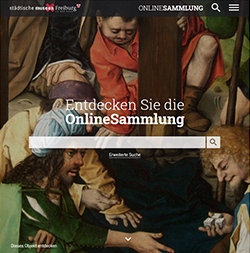Insights into the History of the Collection
Prof. Dr. Ernst Carl Gustav Grosse
29.7.1862 – 26.1.1927
Born in Stendal, Ernst Grosse studied philosophy, history, art history and literature in Berlin, Munich and Heidelberg from 1882 to 1887. After obtaining his doctorate in Halle, he wrote his post-doctoral thesis (habilitation) in Freiburg in 1889. He then became a privatdozent for philosophy at the University of Freiburg and began his voluntary work as an assistant in the University's Prehistoric and Ethnological Collection. He was appointed professor of philosophy and ethnology in 1894. Grosse had a keen interest in art and ethnology, with a distinct bent for East Asian art. His expertise resulted in his renown extending way beyond the City of Freiburg. His love of art was particularly beneficial in his honorary position as director of the Municipal Art Collections (1902–1906). In 1907, he embarked on a private trip to Japan. This led to his appointment as a scientific expert at the German embassy in Tokyo in 1908. Grosse remained in Asia until 1913, before returning to Freiburg. He then resumed his university teaching activities, which he continued until his death in 1927.
Grosse and the Museum
Grosse was undoubtedly a major asset to the museum on account of his engagement with and expertise in East Asian art. After Fritze's departure, he joined the Commission zur Gründung eines Museums für Natur- und Völkerkunde (Commission for the Foundation of a Museum for Natural History and Ethnology). During his time as municipal art director, he also had a role as an ethnological expert. Grosse assisted the honorary museum director Hugo Ficke as an expert consultant. In 1901, he drew up a Plan für die Einrichtung der städtischen Sammlungen für Völkerkunde zu Freiburg i. Br. (Plan for the Establishment of the Municipal Collections for Ethnology in Freiburg i. Br.), in which he formulated guidelines for the acquisition of collections. His plan stated that collections should not be acquired through dealers, but independently and in situ in the countries in question. After a great deal of effort, the ethnological section of the University of Freiburg's Prehistoric and Ethnological Collection was given to the museum as a permanent loan. This comprises around 2,000 objects from all over the world and forms an important part of the museum's Ethnological Collection today.
Grosse Donation
The Grosse Collection is still one of the museum's most important holdings today. In 1902, Grosse donated a large number of South East Asian objects and artworks to the museum. The receipt of the collection was recorded in the inventory on 28 October 1902. As a mark of gratitude, his name was entered on the roll of honour. This first donation included musical instruments, vessels, paintings and prints. A second, valuable donation of eighteen Japanese and Chinese prints would follow in early 1904.
Grosse's friendship with the Japanese art dealer Tadamasa Hayashi, which they forged in Paris in 1896/97, was very important for the museum, as Grosse was able to function as the middleman in order that the museum could acquire numerous artefacts from Hayashi.






